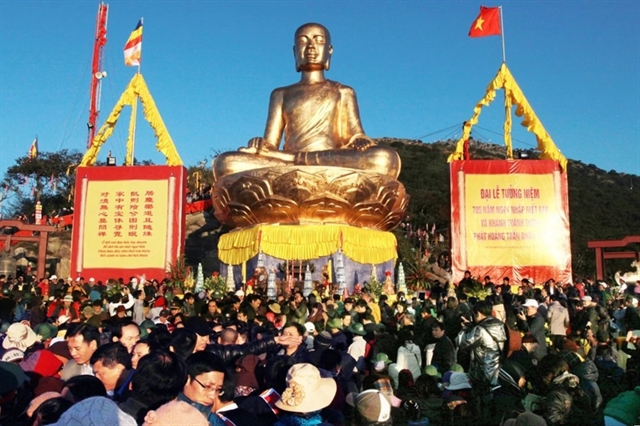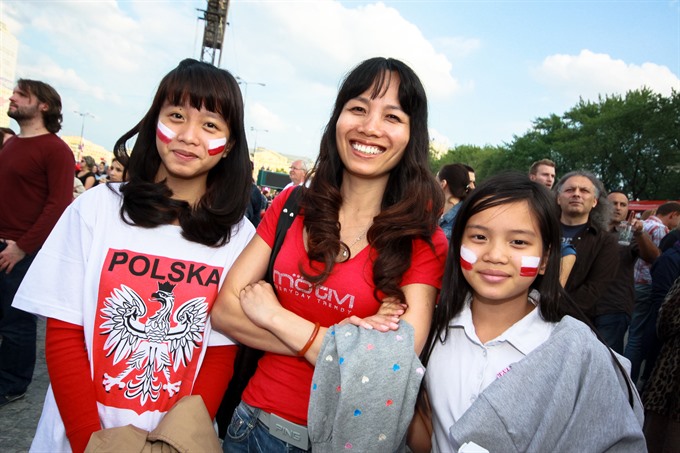 Life & Style
Life & Style

On the occasion of the 100th anniversary of Polish independence, Wojciech Gerwel, Ambassador of Poland to Việt Nam, shares with Việt Nam News a message about his country’s history.
 |
| Members of the Vietnamese overseas community celebrate Polands’s National Day. — VNS Photo Mariusz Cieszewski |
On the occasion of the 100th anniversary of Polish independence, Wojciech Gerwel, Ambassador of Poland to Việt Nam, shares with Việt Nam News a message about his country’s history.
This is a special year for Poland. We are celebrating the 100th anniversary since our country regained independence after 123 years of partitions. It is a time when all Poles celebrate their freedom. Today Poland is a credible international actor, a dynamic economy and a reliable partner to Việt Nam.
Towards the end of the 18th century, Jean-Jacques Rousseau published his last major treatise in which he warned that the Polish-Lithuanian Commonwealth could no longer avoid partition, but stressed that its citizens should do all at their disposal for the Republic not to disappear from their hearts. Rousseau was greatly impressed by the Republic’s extraordinary civic tradition. Polish democracy was one of the oldest in the world and built on a parliamentary tradition dating back to the 15th century. The Republic enjoyed great religious and ethnic diversity and tolerance, and had hardly any parallels in Europe when it came to safeguarding civic rights.
As Rousseau had predicted, the Republic came to the brutal end with the military invasion by its powerful neighbors. Poland disappeared from the map of the world for 123 years, but never from the Polish hearts. Despite heavy persecution, Poles never allowed themselves to be assimilated and the Polish culture thrived all through the 19th century. Poles longing for self-determination and memories of a remarkable past animated their continuous resistance. Generations of Poles paid a heavy price for this devotion, including in numerous battlefields, prisons, executions and forced exile.
Through steadfast commitment on the part of countless Polish families across five generations to preserve the spiritual and material substance of the nation, and through some historical chance and allied support, on November 11th, 1918 the dreams of generations of Poles finally came true: Poland regained its independence.
Yet there would have been no independent Poland at that time – nor through the vicissitudes of the 20th century that followed – without the norms and ideals that lay at the foundation of the League of Nations, and later the United Nations. This is why Poland is still such a vocal champion for the rules-based international order, based on principles such as adherence to international law, respect for state sovereignty and territorial integrity, peaceful resolution of conflicts, and transparency and dialogue in international affairs.
There are many reasons why the nations of Poland and Việt Nam are close to each other despite the large geographical distance. Our common appreciation for hard-won independence and national self-determination, forged through a parallel history of hardship, is one of these factors – which relevance is highlighted by today’s anniversary celebrations.
But our strong bilateral relationship would not have been possible without people-to-people contacts that started in the 1950s. More than 5,000 Vietnamese students have graduated from Polish universities so far and most of them have continued to nurture special bonds with Poland. Today hundreds of smart Vietnamese students take up their scholarly pursuits in Poland and their number has been increasing year by year. It is only to be hoped that one day they will also contribute to the development of Việt Nam and even stronger co-operation between two countries.
Our close bilateral partnership has also been forged through the valuable presence of the Vietnamese community in Poland and through their many contributions across different fields. Poland has been enriched, both culturally and economically, by our fellow countrymen from Việt Nam who have chosen Poland as their home. Poles are proud that they feel at home there.
It is little wonder that such a rich tapestry of people-to-people contacts has stemmed vibrant cultural co-operation. Examples are too many to list in a short article but suffice it to mention a few emblematic examples. For instance, Poles appreciate the fact that Việt Nam’s cultural elites hold Kazimierz Kwiatkowski (“Kazik”) in their cherished memory – a Polish architect who made significant and often pioneering contributions to the preservation of Vietnamese national heritage (Huế, Mỹ Sơn, Hội An). In 1928, only ten years after Poland regained independence, The Tale of Kiều by Nguyễn Du was translated into Polish. Today a wide array of Polish literary pieces have been made available to the Vietnamese audience thanks to the assiduous work of several gifted interpreters.
The dynamic Polish-Vietnamese relations have been strongly facilitated by close political co-operation. Last year’s visit of the Polish President Andrzej Duda to Việt Nam has stepped up bilateral relations to a new phase. This was followed in September this year by a very successful visit of Deputy Prime Minister Trương Hòa Bình to Poland and by a recent meeting of prime ministers on the sidelines of the ASEM Summit in Brussels.
Close political relations have set a proper context for the development of vibrant economic exchange. In 2017, Poland and Việt Nam reached US$2.3 billion in bilateral trade, and during the first seven months of this year trade turnover rose by 50 per cent. This dynamism reflects the growing economic potential of both countries. The Polish economy has been growing at one of the fastest rates in Europe for almost three decades. In 2018 its GDP growth may approach 5 per cent. This gives rise to countless business opportunities.
As Poland celebrates the centennial of regaining its independence, we look forward to building on the rich tradition of close co-operation with Việt Nam in order to forge ever closer bilateral ties in the years to come. — VNS




